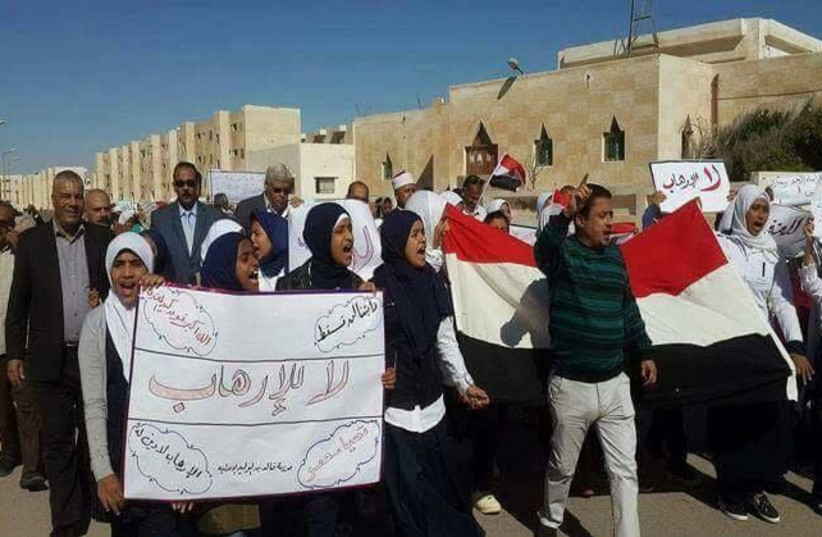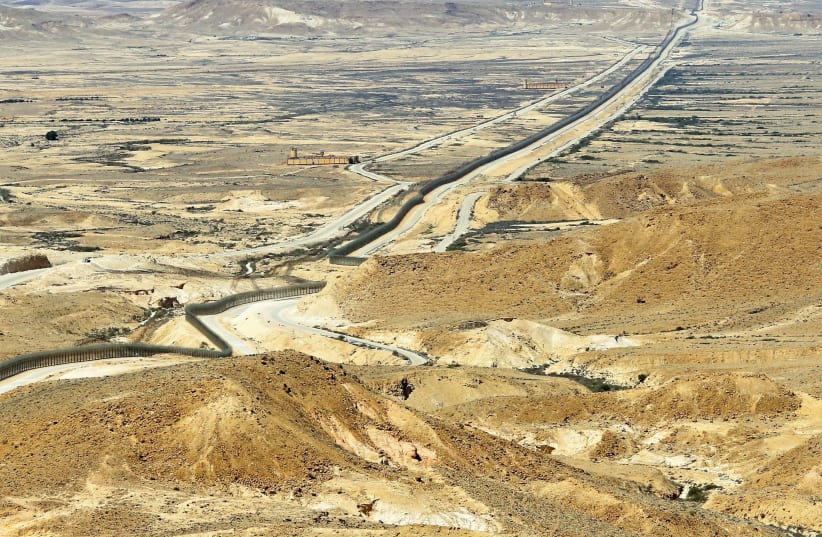Egypt has been fighting terror threats in the Sinai peninsula for more than a decade. Today Egypt may have turned a corner on this threat. Reports in Ahram Online in Egypt and Al-Ain media in the UAE portray Egypt as having “freed” Sinai from terrorism.
The article in Ahram notes that “last weekend, President Abdel-Fattah Al-Sisi visited military and security sites in Sinai, east of the Suez Canal. The visit, which came a few weeks after he hailed the success of counterterrorism operations in the peninsula, was anything but routine. As presidential statements and Al-Sisi’s itinerary made clear, the trip was designed to showcase the second component of the counterterrorism strategy, namely the comprehensive development of Sinai.” In the past Sisi has compared the struggle in Sinai to the October 1973 war, marking it as an important and essential military turning point for Egypt.
The traumatizing conflict
Why has this conflict been so traumatizing? There were extremist groups in Sinai for many years. Back in 2004 there was a terror attack in Taba. Palestinian terrorists infiltrated Sinai and also sought to use the area to traffic weapons, from as far away as Libya. Later, extremist groups such as ISIS infiltrated the area. However, in the Arab Spring of 2011, the overthrowing of the Mubarak regime and the short period of the Muslim Brotherhood's rule in Egypt that brought the Sinai trauma to the forefront.
According to the Ahram article “on 5 February 2011, Sinai witnessed the first terrorist attack following the 25 January Revolution. It would prove to be no more than a prelude to the waves of attacks that erupted following the 30 June 2013 Revolution which overthrew Muslim Brotherhood rule.” The point the article is making is that the rise of the Brotherhood encouraged the extremists. Sinai became a trauma as security forces faced casualties fighting the extremists. When Sisi came to power he made defeating terror a key platform. Today Sisi is indicating that the area if free from terror threats.
The article in Al-Ain notes that “the state in Egypt waged a war against groups of violence and extremism after 2013. The state confronted these organizations in all Egyptian governorates without exception, foremost was the northern part of the border governorate, Sinai. The security services also did a good job in confronting these organizations in this governorate. Its performance is no less brilliant in confronting these organizations in the rest of the Delta governorates.” The article notes how Egypt first had to confront the Ansar al-Bayt al-Maqdis terror group in North Sinai. “Either in the middle of the olive farms, which cover an area of about 20 kilometers, or in the underground tunnels that fill Sinai, which made it difficult for the security services to battle; These extremists were spreading among the people. The first and foremost goal of the security services was to preserve civilians, and these agencies took into account the necessity of confronting terrorism and terrorists and the necessity of preserving civilians.”


The article notes that the Bayt al-Maqdis group was “supported by the terrorist Brotherhood” and that it announced its allegiance to ISIS after 2014. ISIS also claimed responsibility for downing a jet liner in 2015, a claim Egypt disputed. In 2015 terrorists also attacked an Egyptian naval vessel. 2015 was a peak year for the extremists. They attacked historic tombs, and gas pipelines. In 2017, the terrorists massacred 300 people at a Sufi mosque. This was the worst era of terror in Sinai. Al-Ain media says that there were 11 extremist groups operating in North Sinai. “All these organizations began working in coordination under the support of the terrorist Brotherhood, whether through forms of logistical support.” While the Brotherhood had briefly run Egypt between 2012 and 2013, by late 2013 it was banned and Egypt came to view it as a terrorist group.
Today, Egypt believes that the extremist groups previously present in Sinai no longer exist as they used to. It has taken ten years, but these reports portray the terrorists as having been thoroughly defeated. “These extremists were eliminated in Sinai, and life returned to it again. Perhaps the state provided a vivid example of an experience that has become illuminating before the entire world. Rather, it has become a source of inspiration for everyone who wants to confront terrorism. Perhaps the celebration was not limited to Sinai, but to all of Egypt,” the report at Al-Ain notes.
The defeat has been accomplished through local reform, confronting extremist ideas in religious institutions and also shifting educational priorities. “This vision is perhaps the most important in the future. After dismantling extremist organizations, the project must focus on dismantling the remaining ideas of these extremists. Therefore, deepening the approach must be through dismantling the foundational ideas of violence in all its forms and manifestations,” Al-Ain notes. The report says that Egypt may be able to export these lessons to other areas.
“The international community, with its institutions such as the United Nations, must have a role in sponsoring successful experiences in confronting terrorism, and it must also take what is appropriate from them and put them within a strategy of confrontation that suits the rest of the world and takes into account the conditions of countries, whether Arab or non-Arab, given the depth, strength and greatness of the Egyptian experience,” the report says.
Ahram’s report agrees. “Not a single attack took place in the first quarter of this year. The Sinai-based IS franchise has also halted publication of its usual communications and bulletins. Given the central IS organisation in the Levant continues to issue such publications, the cessation is a sign that Sinai is now free of the terrorist group.”
It remains to be seen if the reports are fulfilled and whether Egypt’s security forces can keep the peace in Sinai. The troubles in Sinai were fueled in part by some of the major changes in the region that took place in the early 2000s. That was an era where extremist groups also took hold in Iraq and after the Arab Spring this chaos also filled power vacuums in Libya, Yemen, Syria and other places. It’s important also to note the role that Hamas in Gaza and weapons trafficking had in spreading the chaos that helped lead to terror. Today with countries re-asserting their authority in the region and with tensions between states decreasing, the ecosystem that enabled terror may be decreased.
